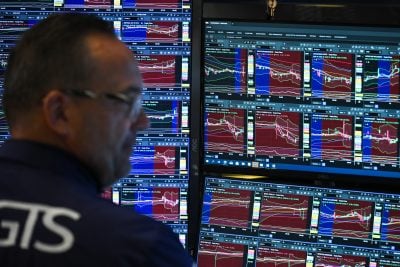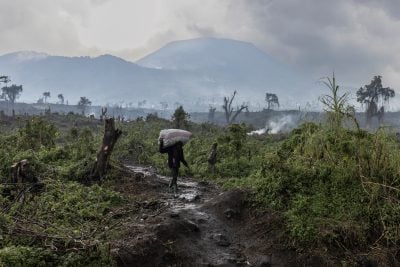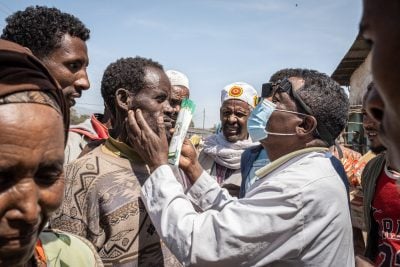Abebe Selassie, director of the IMF’s African Department, knows a thing or two about crises. He was the chief negotiator for the IMF when Portugal came calling at the height of the European debt crisis that followed the financial meltdown in 2009. He was hailed the “saviour of Portugal”, with cameras following his every move and his appearances in parliament.
In the following interview, he shares his outlook for Africa and the world at another moment of crisis.

In all your interviews and statements, you say that the IMF is the lender of last resort but you seem to be the lender of first and last resort right now, the only game in town?
Abebe Selassie: We have had a significant financing role for the region in the last couple of years in particular. I will say circumstances warranted it. We have just been through a once-in-a-century shock in the shape of the pandemic and this was followed up by a series of other really very severe shocks which themselves would happen once every 20 years.
Given that we are an entity whose raison d’être is to be there to support countries for exactly situations like this, we have played a significant role and we are proud to have played that role.
I don’t think this is a case of us being the only game in town. I would say cyclically, it is the time for us to do what we can – and we have done it.
The amount of support we have provided is very significant. Specifically, between March 2020 and as of this summer, we had provided financing to the tune of $50bn just to sub-Saharan Africa. That is exactly what the IMF is here for, to provide significant financing for countries that need it.
Some people will say that relatively speaking, the numbers are quite small compared to interventions in Argentina or other markets. The assistance that Africa has required is actually relatively minor.
That’s why I’m saying we have played a significant role but we are not the only ones to play a role. There are other institutions and other partners who are active. The role of the IMF is to provide financing but also to play a catalytic role in terms of financing. Second, the financing that we provide has to be commensurate with the countries’ capacity to repay the debt.
Our financing serves two purposes. One is to provide emergency liquidity support when there is no alternative; the second is to support the countries with their reform agenda.
We have regular programmes with quite a number of countries from Senegal to Kenya, all the way to Zambia of course. We have these programmes through which we are providing financing and increasingly also, we’ll be shifting to providing support for countries around climate change.
We have just agreed with Rwanda on a new programme to be supported by our Resilience and Sustainability Trust.
Would you say that on the whole African countries have handled the challenging macroeconomic environment well?
For the vast majority of countries in the region, the difficulties that they are facing now really are on account of the severity of the exogenous shocks.
There are clearly cases where the domestic policy environment is very problematic and that has caused significant challenges compounded by these external shocks.
Would you say that for example, subsidies in Nigeria, which cost the treasury circa $1bn in August of this year, are self-inflicted wounds?
We have to distinguish between self-inflicted issues and policy decisions in every country that are deeply domestic, deeply political but that may or may not be in the long-term interest of the country.
We have seen self-inflicted problems arising from not responding quickly enough or from pressures related to debt sustainability or policy-induced mistakes.
Whereas in most other countries the reason why inflation is accelerating, the reason why financing has become an acute challenge is because external market conditions have fundamentally changed and because of exogenous factors.

Ghana was credited for acting quickly in seeking IMF assistance…
An important lesson very generally but particularly at a time like this when you have so much uncertainty and global conditions and when the downside risks are so high, it really is important to avoid running out of policy space and to take action when you can.
Have there been significant structural or systemic changes to the wider economy as a result of the pandemic?
What the pandemic has done is force us all to revisit and rethink low-frequency risks. Climate change is a good example. We have always known the risk of a pandemic but had never really seen it as an immediate threat. What the pandemic has told us is that we can no longer think in that way.
Low-frequency but high-impact threats are something that we have to build resilience toward. Climate change is very much in that prism so steps need to be taken now to avoid having the kind of complete shutdown of economies and shutdown of lives that has been forced on us.
There is a lot of thinking taking place about what kind of growth model is going to be important. In what other areas do countries need to strengthen supply chains, especially in terms of critical goods? Where do you need to build resilience?
Another area I see needing attention is how to tackle the big increase in poverty as a result of the pandemic. Ultimately, these decisions are going to be domestic and political ones, but addressing them will be critical.
You have spoken about the need for a social contract between governments and their people but you also mentioned a social contract between the international community and the continent. Can you elaborate please?
One thing that became crystal clear when the pandemic broke out was how we are all in this together. You cannot have a system where you can completely isolate yourself, and if you do that, it would be at tremendous economic cost for the rest of the world.
The second is that African countries have been impacted way more, economically speaking, than other parts of the world. Many countries haven’t seen their economies recover to pre-pandemic levels, whereas most advanced countries have.
In a context like this and where Africa is by far and increasingly, the most dominant contributor to the labour force in the world, it would be very myopic for the international community not to invest now – and I would stress the word now – in strengthening human capital development in the region, in financing infrastructure, because that’s where future economic growth, future consumption is going to increasingly come from.
You made a point to say that you’re not the only game in town…
We shouldn’t be. But one challenge of the last several years has been that over time we’ve seen the amount of overseas development assistance (ODA) that has been coming to the region declining. This has declined from about 4% of recipient country GDP to around 2.5% now.
That trend needs to reverse, for exactly the reasons I cited earlier, to deal with both cyclical but also structural issues, to help the region meet the Sustainable Development Goals, to help the region address a lot of climatic challenges that it’s increasingly being affected by.
We are trying to do our part, and intervened to deal with the cyclical shocks I’ve mentioned – even supporting structural changes, by increasing the amount of resources that we can make available to tackle things like climate change, but it’s something that has to go well beyond the IMF.
What are the sources of funding available to governments today? The international capital markets are more or less shut off.
It’s going to be, as always, a mixture and there is not going to be a single source of financing that is going to make up the shortfall. More recourse to IMF financing is an option for some countries. For others, accessing resources from MDBs.
We will also help at the margin. If bilateral official creditors could step up with more financing, that could help a bunch of other countries. We have also seen countries make recourse to domestic markets for financing and that will also provide some support.
We also have to find more innovative ways. There is the whole issue about making sure that African countries can access funds to address the climatic change challenges and to see if there are ways in which current credits can be traded.
A lot of new thinking is also needed to supplement these traditional sources of financing.
It’s incumbent on everybody to try and step up the amount of financing that can be provided to the region. But I want to be clear on something: financing in itself is not a solution. Financing when it goes hand in hand with reforms will have the requisite effect.
If you are financing and money is not going to facilitate investments that you need in raising production in agriculture or health or education or addressing critical infrastructural needs, it’s just debt and that will not be paid back. The reform side is really important.
Governments need to do more in terms of revenue mobilisation, again a point I keep repeating. Over the last decade or more, countries have been really good at investing in the right areas: health, education, and infrastructure. What countries have not been as good at is collecting the “rates of returns”, capturing the rates of returns on all of these investments through the tax system.
Is the reform agenda on a positive trajectory or do we need to step up again?
It depends from country to country, its really difficult to generalise. Countries go through cycles and sometimes advancing reforms is difficult, whether for political or other reasons.
We saw numerous reforms in the 90s when macro challenges were the key issue. Institutional reforms like providing central banks with more operational independence, fiscal deficits that are consistent with the amount of financing that is available etc. Those have stood us really well over the last 15–20 years.
Now the challenge has shifted a little bit [and it’s] more about the quality of growth, like how can we achieve not just 7-8% growth, but how can we make that growth go hand in hand with more equality, more economic diversification.
And now, in the immediate post-Covid period, the issue of social protection is really very pressing. How do you make sure that you reverse the increase in poverty that we’ve witnessed, the increase in dislocation that we’ve seen? Food insecurity is rising as a result of the surge of food prices. I think paying attention to all of those things will be important.
In terms of your own role, do you fight Africa’s corner at the IMF level? Do you have to fight for greater support for Africa?
Honestly, I don’t think the managing director of the Fund needs convincing about what an important role the institution plays in the region – nor indeed did Christine Lagarde before her. They have both had a very strong focus on making sure that the institution is there for the region. It operates as the safety net and I haven’t needed to be very overt in making the case for the continent.
What about the shareholders? Are they convinced as well?
You can see how much we’ve been allowed to support the region in its hour of need, in the context of the pandemic and subsequently. But it’s an ongoing effort and we have to make sure we don’t stall and that we continue to support the region because conditions certainly have not relented.
The international community has been very supportive of the initiatives that we have been taking, that’s why we have the instruments like the Resilience and Sustainability Trust (RST), which has received $45bn from the Special Drawing Rights (SDRs) re-allocation.
Want to continue reading? Subscribe today.
You've read all your free articles for this month! Subscribe now to enjoy full access to our content.
Digital Monthly
£8.00 / month
Receive full unlimited access to our articles, opinions, podcasts and more.
Digital Yearly
£70.00 / year
Our best value offer - save £26 and gain access to all of our digital content for an entire year!
 Sign in with Google
Sign in with Google 



